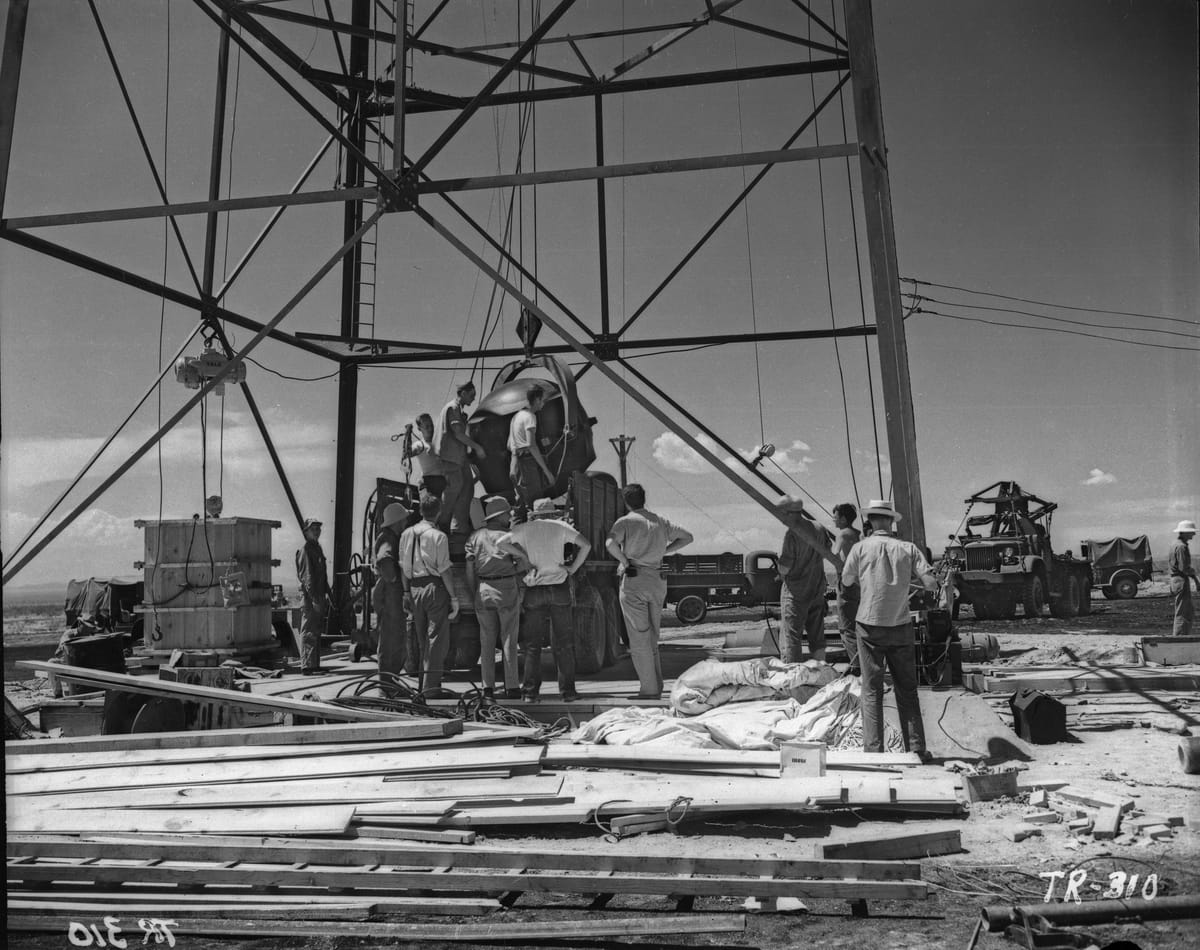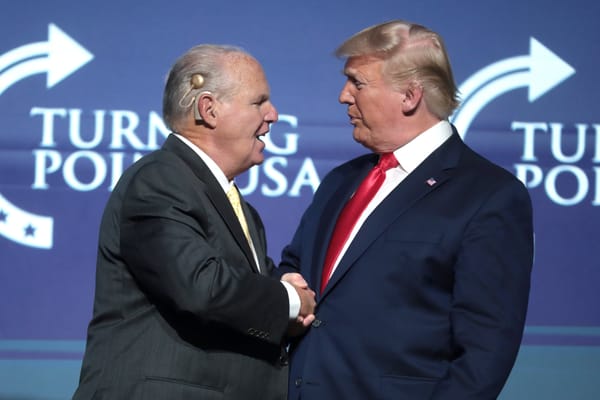The Coming Nuclear Age
Programs of territorial conquest against non-nuclear states must be strongly punished by whatever means available.

After the United States bombed Hiroshima and Nagasaki using the atomic bomb in 1945, George Orwell wrote an essay about what that meant for the future of society. In “You and the Atom Bomb”, Orwell acknowledges fears of a cataclysmic war but also argues
But suppose – and really this the likeliest development – that the surviving great nations make a tacit agreement never to use the atomic bomb against one another? Suppose they only use it, or the threat of it, against people who are unable to retaliate? In that case we are back where we were before, the only difference being that power is concentrated in still fewer hands and that the outlook for subject peoples and oppressed classes is still more hopeless.
Although no such agreement was formally reached, for the duration of the Cold War, the US and USSR followed Orwell’s prediction in practice, avoiding, despite several close calls, direct confrontation that could spiral into a nuclear war. However, on plenty of occasions his assumptions about the relationship between nuclear powers and non-nuclear states did not work out as Orwell expected—nuclear powers France and the United Kingdom were unable to keep ahold of their colonies, and the United States in Korea and Vietnam faced conventional military defeats without using nuclear weapons or the serious threat of them to get its way. And the USSR collapsed despite its nuclear arsenal.
Although nuclear weapons were understood to hold existential conventional threats at bay, new norms, particularly around non-escalation of conventional overseas conflicts into nuclear war, developed along with them. Moreover, the development of the United Nations set strong norms against the absorption and destruction of its members, giving some semblance of sovereign security even to non-nuclear states. The Nuclear Non-Proliferation Treaty, agreed to in 1968, also operated on this assumption, with its final preambulatory clause reading:
Recalling that, in accordance with the Charter of the United Nations, States must refrain in their international relations from the threat or use of force against the territorial integrity or political independence of any State, or in any other manner inconsistent with the Purposes of the United Nations…
The idea of the treaty is that non-nuclear states would be protected by the modern, rules-based order and would thus have no reason to seek nuclear weapons. Incredibly, perhaps, this system more or less worked. The US and USSR clashed over Korea and over Vietnam, but they did not attempt to expand their territories by force in this period. Indeed, during and at the close of the Cold War, most of the initial nuclear powers—the US, UK, France, and the USSR—saw their empires shrink in territorial size, though in each case due to internal independence movements rather than losses to peers.
As the Cold War came to a close, the UN was presented with a very direct challenge to its principles as Iraq invaded and annexed Kuwait, a UN member. The UN, pushed by the United States, responded by authorizing a mission to expel Iraq from Kuwait and re-establish Kuwaiti sovereignty. Ultimately, this mission succeeded in accomplishing its purpose, and at the same time kept the territory of the losing state at least de jure intact. The era of land wars seemed to be coming to an end—the results were too unpredictable, especially since most countries could call on allies to defend them or at least increase the cost of those wars substantially. American intervention in Iraq and elsewhere in the 2000s weakened this premise, and with it, the cause of non-proliferation, but maintained the taboo on outright annexation.
However, this situation faces substantial challenges today and recent events threaten to strain it past the breaking point, with disastrous results for non-proliferation. The immense difference between the safety and security of Ukraine, a non-nuclear state (despite its extensive nuclear power capacity and history of hosting Soviet nuclear weapons) and Pakistan, a state weaker on paper but crucially in possession of nuclear weapons, lays bare the incentive structure that threatens to accelerate nuclear proliferation.
Russia entered into certain obligations under the Budapest Memorandum—signed as part of the process of denuclearizing Ukraine, Belarus, and Kazakhstan. Russia, along with the UK and US, ‘reaffirm their commitment to Ukraine, in accordance with the principles of the CSCE Final Act, to respect the independence and sovereignty and the existing borders of Ukraine, as well as “their obligation to refrain from the threat or use of force against the territorial integrity or political independence of Ukraine”. The full title of the document—“Memorandum on security assurances in connection with Ukraine’s accession to the Treaty on the Non-Proliferation of Nuclear Weapons”, makes clear its centrality to the project of nuclear non-proliferation. Nonetheless, Russia has invaded Ukraine and now seeks to annex four oblasts (in addition to the previously occupied Crimea) thereof. Since the finalization of these annexations in Russian law, Russia has stepped up its nuclear blackmail, threatening (through former President and current Deputy of the Russian Security Council Dmitri Medvedev) the use of nuclear weapons if assistance from NATO countries allows Ukraine to succeed in taking back its de jure territories.
There is little doubt that fear of exactly that sort of escalation has impacted western countries’ willingness to act. According to CNN’s Jim Scuitto, senior administration officials viewed Russia’s use of nuclear weapons as a distinct possibility, particularly in time periods, like the liberation of Kherson city, where large groups of Russian troops were in danger of being surrounded. This concern was concrete enough for the administration to start forming contingency plans. Bob Woodward has claimed in his own book on the administration’s approach to the war that in phone calls between American and Russian officials, the Americans pointed to their restraints on Ukraine’s long-range weaponry as a reason for Russia not to use nuclear weapons during that same period. We won't know with certainty how these calculations impacted Biden’s decision making on what weapons to send—and what to withhold—from Ukraine, but the question of nuclear weapons obviously weighed, and continues to weigh, on any discussion of intervention.
While for some time Russia masked (thinly) its expansionist intentions behind a façade of granting ‘independence’ to groups like South Ossetians, in negotiations around the current war there is no longer any question that what the Federation is asking for is complete territorial control. Moreover, unable to capture major cities like Zaporizhzhia or hold cities across the Dnipro like Kherson, Russia seems to be using the threat of escalation to demand the handover of territory they have been unable to capture by conventional military means. Ukraine, deprived of nuclear weapons, has been forced to give its assent to a proposed thirty day ceasefire that would have allowed Russian soldiers to remain, unharassed, in Ukrainian territory. But without nuclear weapons, even such a limited ceasefire beyond their power to enforce—the offer has been on the table for months, with Russia finding various excuses to instead continue its attacks on Ukraine and bombing of Ukrainian territory.
The contrast with the April-May 2025 crisis between India and Pakistan is stark. India, holding Pakistan responsible for a terrorist attack in Kashmir (territory both states claim and have claimed since 1947), launched a series of air strikes on Pakistani territory, setting off a direct clash between the air, artillery, and other forces of the two states. Pakistan, facing an Indian state nearly six times its population and ten times its GDP, did something Ukraine cannot do: it called together the council that governs its use of nuclear weapons. Within a few hours, the US disposition towards the conflict shifted: while on May 8th JD Vance had been proclaiming that the South Asian conflict was ‘fundamentally none of our business’, Trump was shortly thereafter announcing a ceasefire and claiming he had offered economic sticks and carrots to make it happen. Whatever the reality of US involvement—India and Pakistan have downplayed any American role— the announced ceasefire came into effect, with no territory changing hands and no immediate announcement of any Pakistani concessions whatsoever.
The lesson for any state with potentially aggressive neighbors and the capacity to do so is clear: only by developing nuclear weapons can their sovereignty be defended. The entire foundation of the non-proliferation program has been swept away: legal defenses, security guarantees, and even signed treaties are absolutely meaningless in the face of nuclear-armed aggressors.
Does this mean we are inevitably on a path to a world where nuclear weapons are held by dozens of countries as their only real means of security? This is the outcome nuclear policy has been seeking to avoid for seven decades. The more fingers are on nuclear buttons, the more likely one is to slip and devastate a rival with humanity’s most catastrophic weapons. Fortunately, it is not yet inevitable—but as a globe we have come to a major fork in the road. A world where remaining nuclear-free is a viable option for independent states can only be salvaged if US and European policy makes clear that programs of territorial conquest against non-nuclear states will still be strongly punished by whatever means available. Much of the damage has been done, although the US still has some levers to pull to attempt to correct it. While it has always had somewhat limited options regarding Russian aggression, the US has not exhausted even those. Most important is continuing to arm Ukraine to the greatest extent practical and with modern weapons, an effort that the previous president was cautious about and the present one seems, depending on the week, altogether hostile to. The recent attempt to force a May 12th ceasefire with an ‘ultimatum’ on Russia—only to see that proposal become one for a meetings in Turkey that ultimately proved meaningless—is a demonstration of American weakness in the face of Russian nuclear blackmail, but also provides a good opportunity to finish ramping up sanctions on Russia and increasing aid to Ukraine, without restrictions on its use.
Even this, though, is unlikely to drive the Russian army entirely out of Ukraine. For this reason, it is also critical to make clear that as long as any Ukrainian territory is annexed, Russia will be ostracized and sanctioned to the fullest extent possible. The only way the non-proliferation regime can be salvaged is to make clear that Russia’s actions will not be formally recognized as legitimate, and to inflict a long-term cost on Russia’s economy and diplomatic standing. If Russia succeeds in effectively annexing more land from Ukraine and getting a recognized ceasefire to secure its hold on that land, the response from the international community must be resounding and permanent—any state that does that needs to become a pariah, or else future wars of conquest are all but inevitable. The US has thus far taken the opposite approach, promising lucrative future commercial interaction once the annexation is formalized through ceasefire.
Finally, to add credibility to a position against Russia’s annexation of Ukrainian territory, the US (or, perhaps more realistically, at least European governments) need to be prepared to re-establish, even at some cost, the norm that nuclear armed states leave their neighbors’ territorial sovereignty intact—and apply that same standard to both allies and rivals. In the former group, Israel stands out. While Israel has not relied as directly on its nuclear forces to deter potential interlocutors as Russia has—relying instead on its dominant conventional arms and keeping the nuclear components of its military a mostly unspoken threat—its de facto expansion into Syria and Gaza is nonetheless likely to make efforts at establishing a non-nuclear Iran all the more difficult, both because it increases the potential stakes of being without a nuclear deterrent, and because support for Israel undercuts American credibility in other kinds of negotiations. Recent remarks by Ayatollah Khomeini following the largely unsuccessful nuclear negotiations in Oman have sought to capitalize on the lack of credibility. Preservation of a non-proliferation regime that is based on the principle of territorial integrity for even non-nuclear states will require a firmer US (and European) hand in discouraging this expansionist agenda through diplomatic and economic leverage.
Perhaps even more challenging is China, the other nuclear power that seems committed to land grabs targeting its neighbors. Besides the obvious question of Taiwan, its maritime disputes have been particularly prominent in its diplomatic history. Countries like the Philippines may not be willing or able to develop nuclear weapons even if the global geopolitical environment suggests that is the only sure path to sovereignty; nonetheless, extending assistance to those countries as they assert their territorial integrity and the primacy of international law will help to ensure the protection of broad norms against territorial aggrandizement pursued by nuclear powers. This can take many forms, from economic consequences for China’s piecemeal landgrabs already underway, to more comprehensive efforts at strategic cooperation with those states finding themselves in whole or in part in China’s sites. Whatever the strategy, multilateralism will vastly increase its effectiveness—as we’ve seen with Ukraine, building up a network of countries balancing against a potential hegemon that threatens them all is much more sustainable than the US attempting to face down every threat alone.
Orwell may be correct that the nuclear age is fated to be dominated by just a few states with the capacity to build these weapons. However, this will become much less tolerable (and thus, non-proliferation much harder to maintain) if these powerful states begin seizing land from their neighbors through nuclear blackmail—and the relative safety of nuclear power will be too great an inducement for states like South Korea or Poland to ignore. The United States has wisely intervened to prevent a larger conflagration in South Asia, but it must now seek to use the tools at its disposal to try to rebuild and fortify this norm.
Featured image is "Trinity Device Readied," 1945




